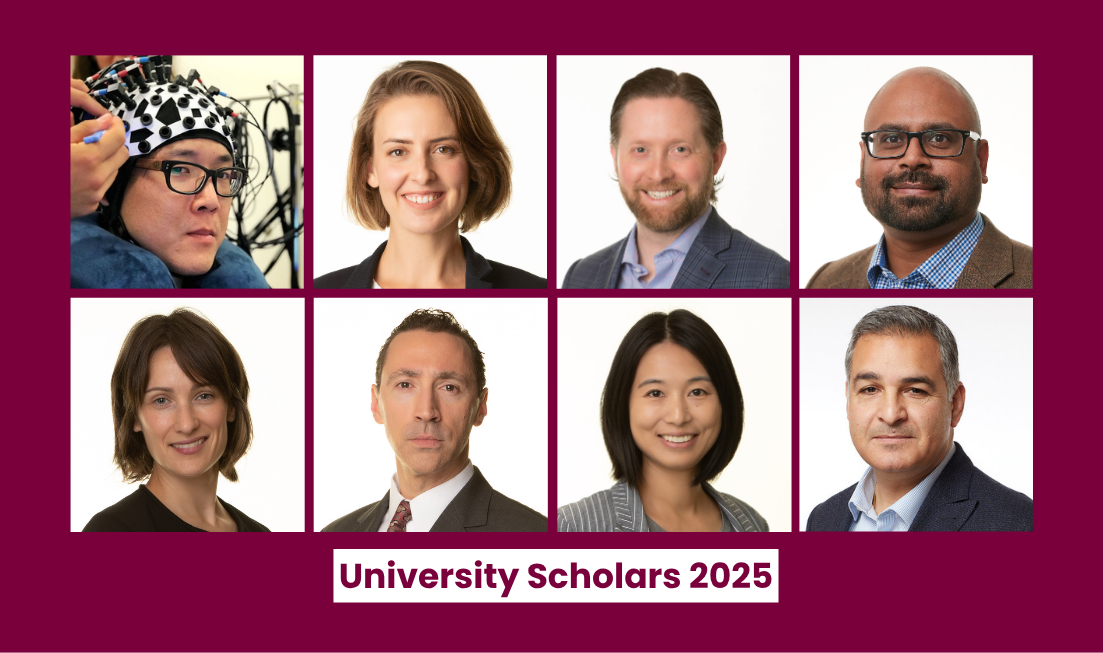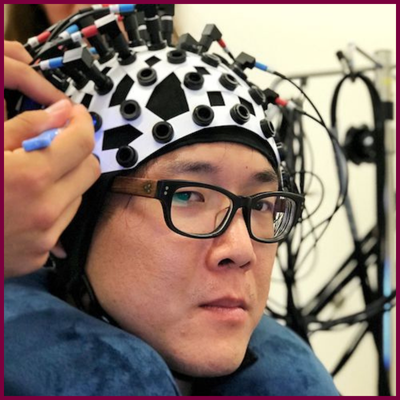Eight remarkable professors named University Scholars

These scholars and have demonstrated a commitment to not only excellence in impactful research, but in teaching, mentorship, and serving local and global communities.
July 9, 2025
Eight McMaster professors have been named 2025 University Scholars, in recognition of their research leadership and the impact of their work.
University Scholars are mid-career researchers who have distinguished themselves as international scholars and have demonstrated a commitment to the discovery, communication and preservation of knowledge, excellence in education and pedagogy, and to serving local and global communities.
Each University Scholar will receive $15,000 each year of the award (up to $60,000), provided by the provost and the recipient’s dean.
Here are this year’s University Scholars.
Stelios Georgiades | Faculty of Health Sciences
 Stelios Georgiades is a recognized global leader in the field of autism research, known for the scope, quality and impact of his work to support children and youth with autism and neurodevelopmental conditions.
Stelios Georgiades is a recognized global leader in the field of autism research, known for the scope, quality and impact of his work to support children and youth with autism and neurodevelopmental conditions.
Georgiades’ research identifies factors that that affect trajectories of children with autism, and his work has addressed gaps in policy, clinical practice and and existing research.
His work has brought to light the many variables that come into play in autism spectrum disorder, highlighting its immense heterogeneity and shaping both the diagnostic criteria and the clinical and research perception of autism.
He is the founder and co-director of the McMaster Autism Research Team (MacART), a network of more than 40 faculty members across faculties working to advance autism research, policy and practice. The largest interdisciplinary autism research group in Canada, MacART has had a significant impact on provincial and federal autism policy, including the launch of the Framework for Autism in Canada and Canada’s Autism Strategy.
Georgiades is also known to be an exceptional mentor, advocate, educator and colleague.
Ameil Joseph | Faculty of Social Sciences
 Ameil Joseph is a leading scholar in the connected fields of critical mental health and disability studies. His research interests are in equity and justice in social work, with particular attention to matters of social and criminal justice, mental health, and health equity.
Ameil Joseph is a leading scholar in the connected fields of critical mental health and disability studies. His research interests are in equity and justice in social work, with particular attention to matters of social and criminal justice, mental health, and health equity.
In addition to focusing on systemic issues of racism and ableism in matters of justice, equity and social transformation, Joseph has also had a profound effect on scholars exploring mental health scholarship from postcolonial perspectives. He has made a significant impact on the evolution of critical scholarship in social work; and is a leading thinker within Critical Disability Studies.
Joseph is known for his commitment to research and advocacy that responds to community needs, working closely with communities, organizers and activists working towards justice and equity, and strengthening networks working for social transformation.
His work was pivotal in the establishment of Hamilton’s Anti-Racism Resource Centre. He is currently working with the centre, the Disability Justice Network of Ontario and the Hamilton Centre for Civic Inclusion on a Future of Canada project that engages community and civic leaders to document and share stories of care, activism and resistance in the Hamilton community.
Joseph has made significant contributions to the School of Social Work curriculum in the areas of disability and ableism, as well as racism and racialized communities, and he is known to be a tireless champion of accessibility in the classroom.
Joseph is also generous with his time, counsel and mentorship, and is often sought out by BIPOC faculty members and graduate students who are navigating systemic racism.
Zhong (Zoe) Li | Faculty of Engineering
 Zhong (Zoe) Li’s research focuses on environmental risk analysis and management, a field that covers complexities and issues arising from climate change and human disturbances.
Zhong (Zoe) Li’s research focuses on environmental risk analysis and management, a field that covers complexities and issues arising from climate change and human disturbances.
Leveraging advanced machine-learning and probabilistic techniques, Li introduces novel methods for water and environmental modeling and develops robust tools to support environmental risk analysis and management.
Li has led or been involved in over 40 projects on predictive modeling of natural water, drinking water, and wastewater systems under climate change and system optimization for water, environmental and energy risk management. She has secured $1.62M of funding as Principal Investigator or co-PI and an additional $11.99M as co-applicant. She has established strong collaborations with partners in industry, government and community.
Li’s methodologies and projections are in wide use in Canada and abroad. The water quality data portal her team developed has been adopted for community capacity building by the Six Nations of the Grand River, which has the largest indigenous membership in Canada.
Li has taught more than 1,300 civil engineering students and is at the forefront of integrating state-of-the-art concepts and techniques, such as climate change and data analytics, into the curriculum. She created a jigsaw reading project for students to explore the latest findings in climate studies and reflect on their application in engineering design. She designed a series of open-ended lab projects to enhance students’ data analytics skills and their understanding of hydrological and hydraulic risks posed by climate change.
Li has enthusiastically mentored the next young generation of engineers, serving on the inaugural Executive Board of the International Water Association (IWA) Young Water Professionals Canada. She helped design and build this new student chapter, and the number of Chapter members grew from dozens to thousands during her service. Li volunteered at McMaster’s YES She Can! Camp program to empower young women in STEM, and was a member of the McMaster Women in Engineering Committee, organizing events to support female faculty and students.
Li volunteered on the McMaster President’s Advisory Committee on Building an Inclusive Community, working to mitigate potential barriers and biases on campus. She volunteers in wetland redesign and river restoration projects, offering her expertise as an environmental engineer to preservation of local natural areas in her neighbourhood.
Vladimir Ljubicic | Faculty of Science
 Vladimir Ljubicic has established an international reputation for outstanding research, and is creative and effective course instructor, an exceptional mentor, and a gracious and affable colleague with a distinguished record of service and outreach.
Vladimir Ljubicic has established an international reputation for outstanding research, and is creative and effective course instructor, an exceptional mentor, and a gracious and affable colleague with a distinguished record of service and outreach.
Ljubicic was recently honoured by the Canadian Society for Exercise Physiology with the 2022 Young Investigator Award. He has been nominated four times by the Faculty of Science for the NSERC AB McDonald Fellowship and has been nominated four times by McMaster for the Royal Society of Canada College of New Scholars, Artists, and Scientists.
Ljubicic’s research investigates cellular and molecular mechanisms and focuses on identifying therapies for neuromuscular disorders, including Duchenne muscular dystrophy, myotonic dystrophy type 1, and spinal muscular atrophy.
Ljubicic has published 55 peer-reviewed papers, which have been cited over 4,700 times, and he has secured several operating, personnel, and infrastructure grants.
Ljubicic has established a program that generates innovative and impactful research that enhances mechanistic understanding of neuromuscular biology and has therapeutic implications for the most prevalent neuromuscular conditions in children and adults.
Ljubicic’s impact is international in scope and his research group is also highly sought-after in research collaborations, valued for their scientific and technical insight to those working in complementary areas.
Ljubicic has taught three courses in Kinesiology with one of his two primary assignments being a relatively large undergraduate third year course that is part of the Integrative Physiology sub- discipline in the Department. This course, Kinesiology 3Z03 serves as the first opportunity for many kinesiology students to consume, interpret, and discuss data from primary research sources. He revises the course annually based on an abundance of feedback from students in the course to better serve the next cohort.
Ljubicic has graduated 8 MSc and 3 PhD students, and all his graduate trainees have received external scholarships or fellowships. Ljubicic also embeds undergraduate students within research projects — to date, he has supervised 58 undergraduate research practicum and 38 thesis students, and is mentoring 8 undergraduates.
Inclusive Excellence is a cornerstone of Ljubicic’s mentorship and his research group attracts and retains high-calibre students with diverse lived experiences. Allyship of equity-deserving trainees and investigators is a key theme of scientific sessions he organizes and chairs.
Matthew Miller | Faculty of Health Sciences
 Matthew Miller’s research focuses on pandemic preparedness and the development of broadly protective interventions to prevent and treat emerging pathogens. Only 10 years into his career as an independent researcher, he has published over 90 peer-reviewed journal articles, including senior authored papers in top-tier journals.
Matthew Miller’s research focuses on pandemic preparedness and the development of broadly protective interventions to prevent and treat emerging pathogens. Only 10 years into his career as an independent researcher, he has published over 90 peer-reviewed journal articles, including senior authored papers in top-tier journals.
Miller’s discoveries have fundamentally changed the way broadly protective immunity is understood. He has made field-shifting contributions to the understanding of respiratory mucosal immunity, and has been exceptionally successful in translating basic discoveries into new clinical candidates.
Miller and his team co-developed the next-generation COVID-19 vaccine that has received over $10M in federal funding and is entering Phase 2 clinical trials. He has received over 30 grants with a value of over $75M in funding, and he is the Canada Research Chair in Viral Pandemics.
Miller successfully led an application that resulted in McMaster being named a Canadian Biomanufacturing Research Fund Hub in partnership with the University of Ottawa and is currently serving as co-Scientific Director of the Canadian Pandemic Preparedness Hub, focused on enhancing pandemic preparedness and domestic biomanufacturing capacity.
Miller has also made major contributions to teaching and pedagogical innovation. His teaching evaluation scores consistently rank at the top of the department. As associate chair of the Biochemistry Graduate Program from 2018-2022, he led major curricular innovations designed to enhance the student experience and the quality and reputation of the program.
Since April 2022, Miller has helped to raise over $70M in federal funding to support infrastructure and programming associated with Global Nexus at McMaster.
Meredith Vanstone | Faculty of Health Sciences
 Meredith Vanstone’s work focuses on aspects of primary care where patient acceptability and experiences matter most, and where clinicians may be challenged by ambiguous or absent evidence. She has established a novel, extremely productive, and highly impactful research program about how patients and health care providers make decisions related to socially and ethically complex aspects of primary care.
Meredith Vanstone’s work focuses on aspects of primary care where patient acceptability and experiences matter most, and where clinicians may be challenged by ambiguous or absent evidence. She has established a novel, extremely productive, and highly impactful research program about how patients and health care providers make decisions related to socially and ethically complex aspects of primary care.
Vanstone’s work demonstrates research excellence and real-world impact in a number of ways, including
- Promoting the integration of social and ethical evidence into health policy decisions
- Advancing social and ethical decision-making about reproduction, including matters such as Non-invasive Prenatal Testing (NIPT) as a second-tier screening test and perceptions of COVID-19 risk in relation to health decisions and behaviours in pregnancy.
- Creating new knowledge about patient experiences and preferences regarding novel health technologies in fields that include family medicine, palliative care, surgery, hematology, psychiatry, and urology
- Strengthening clinical ability to provide humanistic, dignified end-of-life care
- Selecting and preparing physician trainees to navigate ethical complexity, through collaborations with medical education scientists.
Vanstone has been awarded more than $24 million in grants, and is a sought-after collaborator for large clinical grants within and outside McMaster.
Vanstone is also an expert in pedagogy and mentorship. She has developed and taught courses in health policy, aging, gender, and research methods; and has mentored students at all levels, as well as colleagues from multiple disciplines.
Vanstone is also committed to attracting and supporting learners and staff from groups that have traditionally been underrepresented within the academy, and her research continues to examine how groups are differently advantaged and disadvantaged by social and organizational structures and power dynamics.
Gabriel Xiao | Faculty of Science
 Gabriel Xiao is known for his infectious excitement for creative and multifaceted research that harnesses cutting-edge technology to collect high-quality behavioural and physiological data.
Gabriel Xiao is known for his infectious excitement for creative and multifaceted research that harnesses cutting-edge technology to collect high-quality behavioural and physiological data.
Xiao is emerging as the world’s leading expert in the field of dynamic infant face perception, and his research findings have transformed scientists’ understanding of the early development of face processing and visual perception.
Based on a groundbreaking insight early in his career, Xiao created a set of sophisticated research tools that allow infants and children to see dynamic naturalistic faces that move realistically, rather than static images, that don’t reflect what they see in reality. His research program has demonstrated systematically and for the first time how dynamic facial information alters the way infants, children and adults process faces, challenging longstanding views of the field.
Xiao also investigates the development of the own-race bias during infancy. He has discovered that infants as young as four months are biased towards own race faces and perceive them more positively and trust them more than other- race faces. His work has also revealed that we can reduce stereotypes toward other-race faces by exposure to diverse faces and speech and that this also promotes more advanced social cognitive development.
Xiao’s global research network is advancing our understanding of social biases and developmental challenges, with insights that can be used to better foster inclusivity.
Xiao has developed innovative cutting edge tools for his work, which he provies free and as open source material for use around the world to study pediatric visual perception.
Xiao’s research program also strives to understand how humans represent, respond to, and act upon artificial agents and robots — a critical understanding as we increasingly interact with AI.
Xiao’s enthusiasm for his work, his success, expertise and record for securing grants has already attracted a team of talented international trainees who are making significant contributions to our understanding of developmental psychology and are engaged in research with real community impact.
As a mentor, Xiao is extremely generous with his time, helping students for hours to advance their research and understanding as he trains a new generation of developmental scientists.
Andrea Zeffiro | Faculty of Humanities
 Andrea Zeffiro is a remarkable scholar, sought-after mentor, and innovative instructor whose work spans mobile media, environmental and critical data studies and cybersecurity.
Andrea Zeffiro is a remarkable scholar, sought-after mentor, and innovative instructor whose work spans mobile media, environmental and critical data studies and cybersecurity.
Zeffiro’s research program uniquely exposes issues of inclusion, access and equity, enabling creative problem-solving to emergent data management and security issues. Her work translates widely, supporting diverse users of technology to weigh in on the promises and problematics associated with data archives, tools, analytic systems, practices and Generative AI.
Zeffiro’s research not only strengthens academic literature; it informs policy and engages in a breadth of knowledge translation through workshops, research modules, teaching, and nontraditional multimedia
Zeffiro is a sought-after commentator and speaker on data justice and cybersecurity, and represented McMaster at the invitation-only 2022 Canadian Institute for Advanced Research and Data Sciences Institute U15 Data Sciences Retreat.
Zeffiro’s early research with online participatory storytelling has inspired several similar projects. Her current research focuses on data cultures and critical data studies, examining data as both a technical and ideological construct, and exploring themes of failure, futurity, and friction in data systems. She’s also exploring cybersecurity practices that deepen disparities, particularly for users with disabilities.
Zeffiro’s Critical Data Studio, launched on Instagram, archives and disseminates her research at the intersection of critical data and media arts. The core projects under this initiative include “Expanded Data,” funded by SSHRC’s Connection Grants program, which explores the integration of data- driven technologies in media arts.
Her ongoing projects and leadership roles demonstrate her commitment to advancing research and education in digital scholarship, data culture, and environmental communication. But her impact extends beyond academia through her community-engaged projects: Zeffiro leads a McMaster Societal Impact Seed Grant-funded research project in collaboration with the Sex Workers’ Action Program (SWAP) Hamilton, which studies the cyber insecurities faced by sex workers. This project uses zines as participatory action research, prioritizing the equitable participation of individuals and communities throughout the research process and will produce a zine-based workshop model that other under-represented groups in cybersecurity can use to document and educate about group-specific cyber insecurities and safety needs.
Zeffiro’s has supervised, trained, and mentored 121 students at the undergraduate, graduate, and postdoctoral levels, and has mentored 24 graduate students in their MRP theses and dissertations. Crucially, her numerous funded research projects have integrated over 20 students as research assistants with whom she has co-authored peer-reviewed academic journal articles, conference proceedings, and industry reports.
Through her leadership, the Sherman Centre has become a hub for interdisciplinary research and training, fostering the next generation of scholars in digital scholarship and data cultures.


